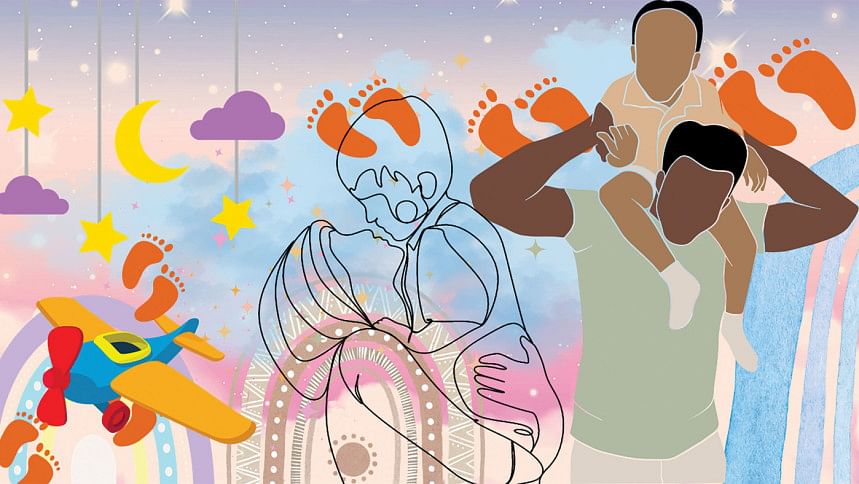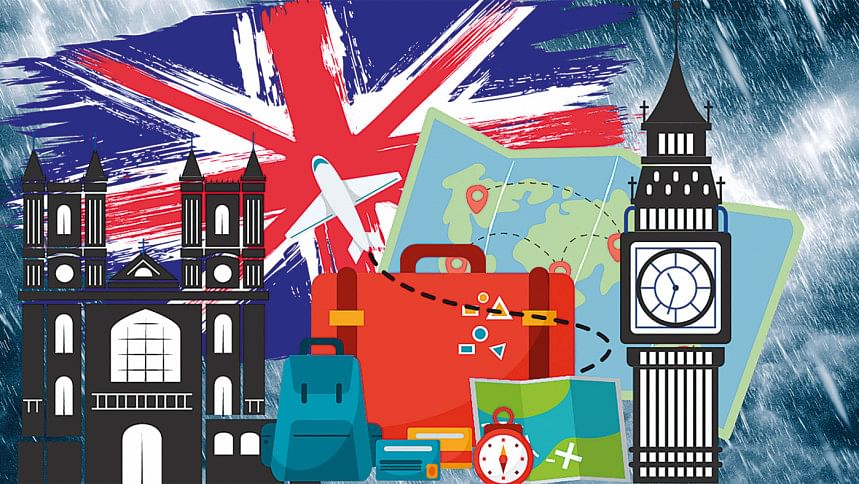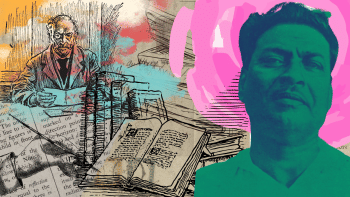Homeward

When I was born, my skin was dark, like my grandfather's, in whose arms I discovered my first home. Relatives old and new, whose disappointment was being nursed by my parents' fair complexions, looked from afar as my rotund cheeks melted into the sleeves of my dada's discolored half-sleeve shirt.
For months, I wept and slept, slept and wept, on the shoulder of this dark and gentle giant, occasionally detaching against my will to be breastfed by an exhausted ammu who was grateful, for the time being, to be my home away from home.
My dada's shoulders and my ammu's breasts carried me into a toddlerhood where my skin began to betray its bond with my grandfather, lightening to a porcelain whiteness so "dhob-dhoba," they said, that relatives used one hand to shield their eyes from its immaculate glow and the other to shield me from the evil eyes of envious entities. "Eto fair, so forsha" they said, extending the "sha" so that it floated through the air, eventually falling gently upon my soft, bright skin.
I remained blissful in my ignorance. A creature of habit, armed with an unwavering conviction, I continued to make myself at home, arriving on doorsteps unannounced, walking in as if I owned the place, opening fridges without permission, ordering servants to do my bidding, turning on air conditioners which blew cold, expensive air into my sweat-stained, darkening skin.
My mother had given birth to me into a household whose reach spanned across several infinities. My paternal grandfather's nine brothers and sisters stretched in one direction, bellowing diverse histories of national significance, while my mother's nine brothers and sisters did the same in the opposite direction, herding in bhaat, bhorta, and Bollywood, with a special emphasis on the power of gossip and an unwavering devotion to Allah.
Doors opened in unison to receive me. My tiny feet waddled arrogantly across mosaic floors, as each relative, comprising every khala, mama, phupu, chacha, and everything else in between, bent down to lift me up into a sky of kisses and baby talk. Every direction led to a place I made my home, every person I met I made into a parent, every mattress I lay down on I made my bed.

If home is where the heart is, imagine the infinite expanse of the tiny heart beating inside my chest, omnipresent and greedy in its capacity to receive love and comfort, traveling across generations and hometowns, across low-rise apartments and tin-roofed huts, weaving through the streets of Dhaka, gliding along the rivers which pump life into the farmlands of Bangladesh.
And on these two familial wings, I traveled not only beyond and in between, but also up and down. Up to one of my chachas, my dad's cousin Pintu, spilling relentless history and dwarfing us with his limitless knowledge, turning rooms into stages and everyone else into audience members. Down to my mamas, Akbar, Anis and Bablu, and their factory of sweetmeats tucked into the basement of my mother's ancestral three-story home, in the risky pathways of which I ran and jumped and bruised with cousins, stepping over floors carpeted by hungry flies.
But as I learned to speak with an underbite and my skin started to brown under the equatorial sun, alcoholics beat their children, druggies beat their wives, a lack of an education led to a lack of revenue. A decade of financial success came to an end for a Dhaka sweetshop that refused to evolve; seasoned by death and divorce, brothers stole land from sisters, sisters pawned off wedding jewelry to shield their husbands' fragile egos; my favourie dark-skinned dada reached his expiration date while the smartest chacha in the universe fell prey to the stock market and alcohol; some of our mothers fought losing battles against incurable diseases, desperately scrambling away from inadequate healthcare at home and towards unaffordable healthcare abroad.
I remained blissful in my ignorance. A creature of habit, armed with an unwavering conviction, I continued to make myself at home, arriving on doorsteps unannounced, walking in as if I owned the place, opening fridges without permission, ordering servants to do my bidding, turning on air conditioners which blew cold, expensive air into my sweat-stained, darkening skin.
Who could blame me? No matter the inevitability of change, certain things were immune, surely? Had I not been taught that familial relationships were unbreakable bonds which lasted forever? Had I not listened to story after story about messengers of God who had shunned material desires and preached kindness, love, generosity, and, more practically, the redistribution of wealth? Was I also not the descendant of the nation's educated elite on one side, their roles etched permanently into this country's independence? And, on the other side too, was I not the progeny of the God-fearing owners of the infallible Alamgir Sweetmeats of Asad Gate, whose sponge roshgollas were as famous as Mimi Chocolate and Akij tobacco?
Were homes not permanent places? Were they not entities you could always return to?
Dhaka sprawled outwards into a hungry metropolis, fed by its cheapest and most valuable resource: its people. But all of us were not ready. My homes, without my knowledge, had been transformed into real estate. My cousins inherited these along with their parents' feuds, spewing blind hatred towards one another.
My ignorance could last only so long. I heard whispers through the newly formed cracks in the familial walls; sensed a heaving weariness at my arrival. I heard stories of food and AC remotes being hidden, safe from my greedy mouth and hands. These came from the same mamis whose cooking had once beckoned my Noakhali stomach with such enthusiasm, the same chachis whose thick gravies I had greedily slurped down for an entire childhood.
I could no longer deny it: I was overstaying my welcome.
But I needed a place to go to, too young to return to a motherless apartment after school, my father at work. Out of necessity, I arrived at closed doors and politely rang the doorbell, seeking permission to enter. At the dining table, my empty stomach desired to devour, but I chose carefully, extending my hand only after everyone else was done, further ensuring that the amount on my plate was moderate and reasonable, fit for a guest.
I refrained from using the household amenities as much as possible, from bathrooms to fridges to televisions, ensuring minimal room for dissatisfaction. I expended an excruciating amount of effort towards becoming as quiet and as invisible as possible, existing apologetically. I was a constant trespasser, moving with nervous energy in the shadows, shunning attention, finding shelter in nooks and crannies. Whispers still reached my father's ears, speaking of his unwelcome son, proof of his failure as a single parent who had refused to remarry.
Who could blame them? Charity may begin at home, but the times were a-changing, baby, and Bangladesh with it. Charity was something we did in the 70s, in Bangabandhu's Bangla Desh. This was a brand new country, of Digital Bangladesh and a billion-dollar ready-made garments sector and middle-income ambition.
If every home had once held my heart, imagine the infinite numbers of pieces into which my heart had been broken. Homeless, I bounced from house to house, unwelcoming relatives to semi-welcoming family friends, from adolescence to adulthood, from East to West, running away from Dhaka's sprawling streets to London's historic alleyways.
For several years, through the chartered streets of London I wandered, through ten thousand dancing daffodils I ran, through half-deserted streets I trod, across continents I flew, flapping my broken familial wings in pathetic splendour, venturing beyond borders, cultures, and ethnicities.
But I came back, not out of choice but because of a green passport and an environment hostile to my third-world identity. I found a Dhaka evolved, noisily churning out entrepreneurs and traffic jams. My father had evolved too, finally saying yes, after more than a decade of resistance, filling up my home with a strange woman and other step-thises and half-thats.
These were strangers who would refuse to become family. Seven years later, I continue to exist apologetically. I tiptoe across the dining room and into the kitchen to fetch a mug and make a quiet cup of instant coffee. On a white ceramic plate, I am handed dinner which I consume in my own room, away from the dining table. I excuse myself from birthdays and anniversaries for their convenience. I have no conversations here but, instead, every few days, exchange tidbits of useless information with my father, a 5-year-old girl hanging from his arm.
Three decades of a life semi-lived and I am still filled with an intolerable awkwardness every time I make my way out of my own room and into the terrifying world of the rest of my household. Had I travelled thirty years and several continents only to remain homeless?
Surely, I must've felt at home somewhere, sometime. Yes, there have been moments in my life when I could not deny the existence of a home-like texture to the air. There have been occasions when I discovered people who had carried homes with them and allowed me the privilege of temporary residence.
The walls of my past homes were made of irreverent jokes, first kisses, and unexpected moments of joy. The ceilings were covered with shared memories. Laughter streamed in through the large, open windows. News of scholarships, jobs, and prizes carpeted the floors. Newly discovered musicians performed in the backyard. The air smelt of a perfectly mashed bhorta of garlic and chili.
I had been fortunate at birth to find more homes than my tiny fingers could count. Since then, though homeless, I had been lucky enough to find temporary respite in fleeting moments, places, and people. A home was an occurrence, a one in a trillion chance of finding the right people at the right time, a family of miracles.
How could I go home when home was not a place to find but a moment to be created? No wonder I was exhausted, searching as I was, so desperately, for a place to call home. Let me sit for a second. Lock the door, order some takeout, have a Coke, light a cigarette, stream a nihilistic TV show about a talking horse. Minimize the number of interactions with step-strangers. Replace the rusted strings of your father's guitar and strum a chord or two. Ignore Dhaka as it screams in agony.
Remember, remember, how, once upon a time, in the Highlands of Loch Carron, a Scottish girl with blue-green eyes danced with an awkward Bangladeshi boy as they both miraculously fell in love with each other? For a moment, that boy had been as at home as he had ever been and not even realized it.
Such a moment may come again. One day, the moon and the stars may align, and the rest of the universe may be kind enough to play along. An Amazonian butterfly will then flap its wings as eight billion people move in unison towards a singular goal. And, finally, after all this time, everything will be in its place, and, for a moment, without realizing it, that boy will, once again, be at home.
SN Rasul is a writer. He is currently a Senior Lecturer at the Department of English and Modern Languages at North South University.

 For all latest news, follow The Daily Star's Google News channel.
For all latest news, follow The Daily Star's Google News channel. 











Comments